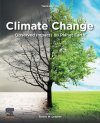About this book
Climate Change: Observed Impacts on Planet Earth, third edition, brings together top global researchers across many disciplines to provide a comprehensive review on the complex issue of climate change and weather patterns. The third edition continues its tradition of focusing on the science and evidence on this highly politicized topic. Every chapter is updated, with this new edition featuring new chapters on topics such as glacier melt, the impacts of rising temperatures, extreme weather, modelling techniques, biodiversity, and more. This book is essential for researchers, environmental managers, engineers, and those whose work is impacted by, or tied to, climate change and global warming.
Contents
Part 1: Introduction
1. Climate Change: A complex problem
2. The Role of Atmospheric Gases in Climate Change
Part 2: Tools Used to Investige and Predict Climate Change
3. Climate Change through Earth's History
4. Numerical Modelling of the Global Climate and Carbon-cycle System
Part 3: Indicators
5. Global Surface Temperatures and Climate Change
6. Sea Ice and Climate Change
7. Antarctic Sea Ice Changes and their Implications
8. Land Ice: indicator and integrator of Climate Change
9. Glaciers and Climate Change
10.Poleward Expansion of the Atmospheric Circulation and Climate Change
11. Rising Sea levels and Climate Change
12. Ocean Current Changes
13. Ocean Acidification and Climate Change
14. Permafrost and Climate Change
15. The Jet Stream and Climate Change
16. Extreme Weather and Climate Change
17. Bird Ecology and Climate Change
18. Insect Communities and Climate Change
19. Sea Life, Pelagic Ecosystems, and Climate Change
20. Changes in Coral Reef Ecosystems as a result of Climate Change
21. Marine Biodiversity and Climate Change
22. Intertidal Indicators of Climate and Global Change
23. Lichens and Climate Change
24. Plant Pathogens as Indicators of Climate Change
25. Invasive Plants and Climate Change
26. Biological Diversity and Climate Change
27.The Role of Forests in the Carbon Cycle and Climate Change
Part 4: Other Possible Contributing Factors to Climate Change
28. The Variation of the Earth’s Movements (orbital, tilt and precession) and Climate Change
29. The Role of Volcanic Activity in Climate and Global Change
30. Atmospheric Aerosols and their Role in Climate Change
31. Climate Change and Agriculture
32. Widespread surface solar radiation changes and their effects on the Climate: dimming and brightening
33. Space Weather and Cosmic Ray effects and Climate Change
Part 5: Societal Aspects of Global Change
34. Engineering Aspects of Climate Change
35. Societal Adaptation to Climate Change
Customer Reviews
Biography
Professor Trevor Letcher was Professor of Chemistry, and Head of Department in South Africa (University of the Witwatersrand, Rhodes University and Natal) (1969 -2004), and has published over 300 papers on chemical thermodynamic topics in peer-reviewed journals; and 100 papers in popular science and education journals. He has edited and written 28 books of which 18 were published by Elsevier on topics ranging from Future Energy (3 editions), Climate Change (3 editions), Storing Energy (2 editions), Waste, Tyre Waste and Recycling, Wind Energy, Solar Energy, Managing Global Warming, Impacts of Climate Change, Plastic Waste and Unraveling Environmental Disasters. He has been awarded two gold medals: one by the South African Institute of Chemistry and the other by the South African Association for the Advancement of Science. He is currently Emeritus Professor at the University of KwaZulu-Natal, South Africa and at present is living in the United Kingdom.



































